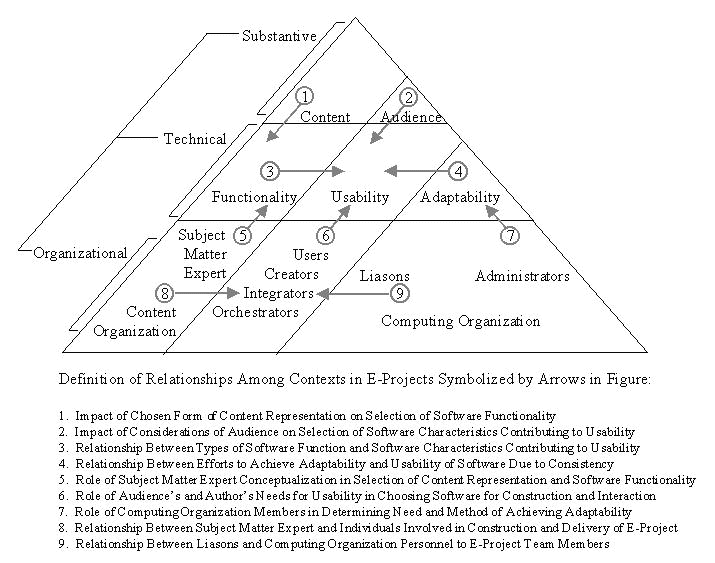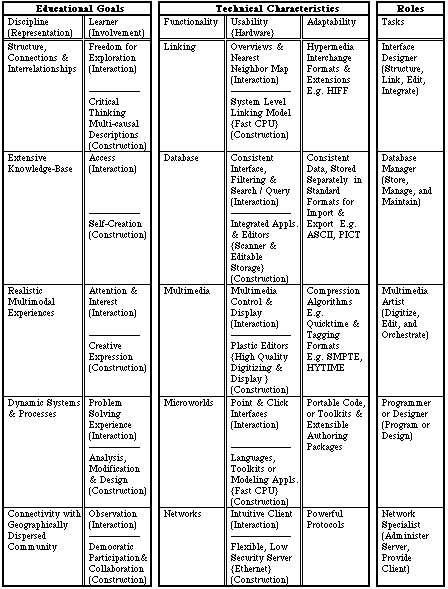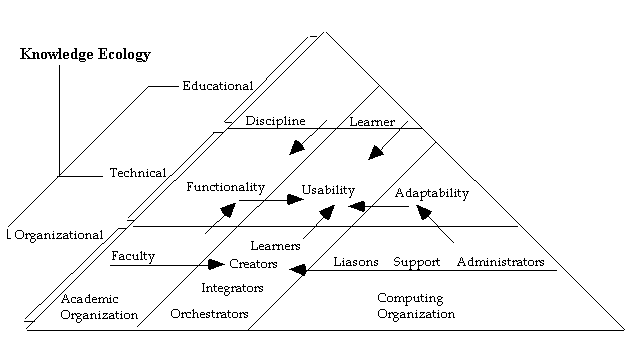Courseware projects in advanced educational computing environments
Mary E. Hopper, Doctoral dissertation, Purdue University, West Lafayette, IN
Overview
Phase 1 - 1980s
(Doctoral Thesis, 1990-93)
Courseware Projects
in Advanced
Educational
Computing Environments
First Expedition
Question
What do viable
projects look like?
Studied "samples
of tomorrow" today!
Jackson, G. (1991) Conclusion
Project Athena in the Evolution of Academic Computing at MIT. In C. Avril
(Ed.), Windows on Athena: Vol.2: Project Athena's Curriculum Development
Projects...And Beyond. Cambridge, MA: MIT.
"The Project Athena experiment embodied
technological, pedagogical, and organizational questions: What does it
take to design, implement, and operate a fully distributed, coherent, vendor-independent,
academic computing environment for a university? How do faculty use such
an environment educationally, and which of these uses prove effective?
Who should manage the environment, support faculty and student users, and
provide appropriate incentives and financing for academic computing to
flourish? Like all experiments, Project Athena also sought to identify
unrecognized issues, costs, and benefits surrounding advanced academic
computing."
[See the more detailed introductory overview for further information
about the general background, literature review and problem statement,
of this study: Introduction Overview]
Methods
Formal Ethnographic (Qualitative)
Projects
Educational computing projects in academic
settings using advanced computing technology across a variety of disciplines.
ESCAPE: Engineering Career System (HyperCard,
HyperNews)
Purdue, Freshman Engineering,
Engineering Research and Information
Systems
Hopper, Lawler, LeBold, Putnam, Rehwinkel,
Tillostson, Ward
Todor (Blox, Athena) and Mechanics
Software (CT, Athena)
MIT, Academic Computing / Athena
Bucciarelli, Daly, Jackson, LaVin,
Schmidt
Engineering Geology Tutor (Athena Muse
2)
MIT, Center for Educational Computing
Initiatives
Kinnicutt, Davis, Lerman, Schlusselberg
Context32 (Intermedia, Eastgate's StorySpace)
Brown, Institute for Research and Information
Scholarship
Landow, Kahn, Yankelovish
[See the more detailed overview of methodology of this study:
Methods]
Results and Discussion (Models)
Triangulated data obtained through interviews
and analysis of documents,
identified key factors and constructed
a model of anatomy with
relationships among key contexts inherent
in the terms:
Educational (Content)
Computing (Technical)
Projects (Organizational).
Projects are carried out in an educational context, they use computer
technology by definition, and they are carried out within the social
and economic structures of the organization in which they take place.

Projects were characterized by simultaneous
attention to a consistent set of key factors across all three contexts.
The challenge was to maintain a balance between the contexts and manage
the relationships among factors!
[For more information, see 6.1 Relationships Among Contexts of Advanced Courseware Projects.]
The factors in the organizational contexts
were far more critical than had been anticipated prior to the initiation
of this research. (Indicated by placing organizational
issues at the base of the model, and representing them visually with the
largest area.)
The projects consisted of complex technical
environments that required regular use and maintenance to survive, so authors
had to become managers of all of the complex substantive, technical and
organizational aspects of projects. Particularly because survival
depended upon finding a way to regularly obtain resources for supporting
continuous maintenance and delivery.

Conclusions (Pointers
to Next Expedition)
Future projects viewed as opportunities
to further develop model of factors and relationships in knowledge ecologies.

[See 6.5 Implications for Research about Future Courseware Projects.]




